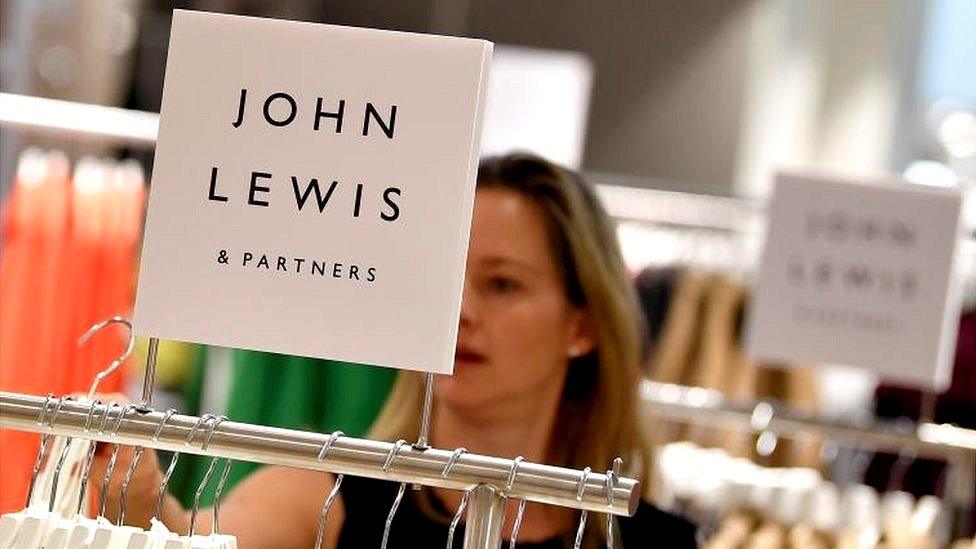John Lewis boss Dame Sharon White to step down after five years
- Published

John Lewis boss Dame Sharon White is to step down after five years, making her the shortest-serving chair in the partnership's near 100-year history.
Dame Sharon's five-year term ends in February 2025. She has told the board she will not seek a second term.
The partnership reported a loss of £234m last year, forcing it to scrap the annual staff bonus.
She said the chain was "making progress" in its transformation but admitted there was a "long road ahead".
Her five-year term as chair will be the shortest in John Lewis's history. Her predecessors each served between 13 and 26 years.
Dame Sharon, who was the first woman to lead John Lewis, had faced controversy after she considered breaking the historic employee-owned structure of the partnership, which also owns the supermarket chain Waitrose, by selling a stake to outside investors to raise money to invest in the partnership.
That plan was eventually shelved.
"Having led the Partnership through the pandemic and the worst of the cost of living crisis, it is important that there is now a smooth and orderly succession process and handover," Dame Sharon said.
Dame Sharon was "the wrong person to chair" John Lewis, according to retail analyst Neil Saunders from GlobalDataRetail.
"She didn't cause all of the issues the company faces, but she's also done much damage," he posted on X., external
"Her ill-advised, and now backtracked on, view that outside equity might be brought in, hurt the morale of partners and showed a lack of understanding of what makes JLP special.
"Her lack of retail experience and her civil service background have, quite bluntly, not served the company well. The next chairman of JLP needs to have both the qualities she lacked."
But Natalie Berg, founder of the consultancy NBK Retail, said Dame Sharon got "somewhat of a raw deal".
"The twin pressures of the pandemic and cost-of-living crisis meant she was too busy firefighting to make genuine progress on the much-needed turnaround," she told the BBC.
"It's not just John Lewis," she added. "Department stores are facing an existential crisis. The model is simply not relevant in today's digital era."
The board is expected to announce Dame Sharon's successor next year.
Who is Dame Sharon White?
Dame Sharon was born in the East End of London. Her parents were part of the Windrush generation, who came to Britain from the Caribbean in the 1950s.
She studied economics at the University of Cambridge and went on to postgraduate studies in economics at University College London.
After joining the civil service in the late 1980s, she worked her way up and in 2013 became a second permanent secretary at the Treasury.
Dame Sharon went on to be chief executive of the media regulator Ofcom in 2015, before joining John Lewis in 2020.
In an interview with the BBC in June, she defended her economist and civil service background, saying that her predecessors at John Lewis had included someone from the civil service and one from an army background.
She said her non-retail experience reflected John Lewis's "unusual structure" of its decision-making, which was more democratic.
Two weeks ago, the partnership announced losses had narrowed to £59m for the first six months of the year.
At the time John Lewis said its plan to return to "sustainable" profit would take two years longer than planned, as a result of rising business costs and larger-than-expected investment requirements.
The group also said its modernisation plans would "take precedence" over its staff bonus.
When John Lewis said in March that it would not pay a staff bonus after a "very tough" 2022, it was only the second time it had failed to do so since the scheme began in 1953.
The department store has faced stiff competition in recent years on the High Street, resulting in a series of store closures, while Waitrose has also underperformed.
Recently, it was reported that Waitrose was considering selling off a number of stores and leasing them back to raise cash.

You may also be interested in:


Sign up for our morning newsletter and get BBC News in your inbox.

Related topics
- Published12 September 2023

- Published10 May 2023
